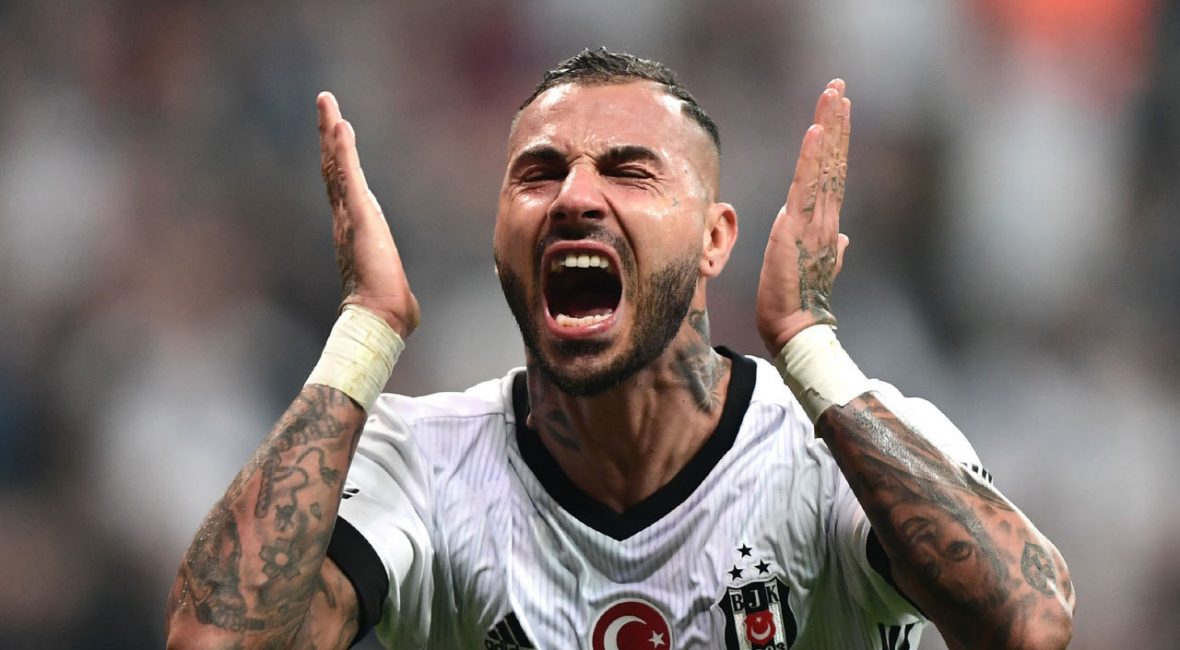3 reasons to come to Besiktas: The Champions League's charmers

The Champions League has become all too predictable.
Dating back to the 2007-08 iteration, only 32 of the 160 entrants – or 20 percent – in the knockout stage have come from outside Europe’s top five leagues. Winner of the 2003-04 title, Porto, made the last 16 on six occasions with countrymen Benfica, Ukrainian giant Shakhtar Donetsk, and 44-time Greek league champ Olympiacos next with a trio of appearances.
Besides that, the Champions League last 16 has offered little hope for continental afterthoughts. Just 10 percent of the sides to progress to the quarter-final stage have come from outside the top five divisions, and two of those advancements were by a Benfica lot that twice knocked off fellow interloper Zenit St. Petersburg. Not since PSV Eindhoven was bounced at the semi-final stage of the 2004-05 competition has a team not from one of Europe’s marquee leagues gotten a sniff of the final as the tournament continues to favour football’s biggest sides.

Besiktas is set to make its knockout-stage debut Tuesday at the gargantuan Allianz Arena, and while Bayern Munich is the heavy favourite to advance to the last eight for the 10th consecutive year, the Turkish league holder is the tournament’s most entertaining side.
Whether or not Senol Gunes’ Black Eagles can disrupt the continental convention, Besiktas should be the favourite side of neutrals who fancy football with a side of flair and a squad with no shortage of appealing storylines.
Here’s three reasons why you should be backing Besiktas:
Eagles on the rise
Five years separated from a financial crisis paired with an astounding 142 lawsuits and suspension from UEFA competition because of match-fixing, Besiktas became the first Turkish club to win a Champions League group. Slotted in alongside Porto, Ligue 1 holder Monaco, and meteoric riser RB Leipzig, Besiktas topped Group G sans defeat courtesy of away victories against each of its three foes.

If there’s any indication that Besiktas can pull off a first-leg shock at the Bavarian behemoth Tuesday, you could do worse than reference the group stages, but for the 15-time Super Lig winner, Champions League progression this season is just a fragment of the club’s lofty ambitions.
“Over the last few years we have built something for the future, rather than short-term goals like the title race,” club president Fikret Orman told ESPN FC. “It was a big step for us involving recruiting the right players, right coaches, brand management, sponsorship agreements, financial arrangements, communication tools, and more. What we are witnessing now is our vision starting to come to fruition.”
Besiktas overhauled its wage spending, employing a more resourceful approach, highlighted by a scant £7.1 million spent on summer transfers, a pittance when compared to the expenditures of its Group G brethren Monaco (£91 million), Leipzig (£45 million), and Porto (£19 million).

Orman should know a thing or two about shifting expectations and unconventional approaches after he took a position nobody wanted in 2012. For some, the president serves as a symbol of a ragtag squad of individuals who have somehow found continuity during Gunes’ taming tenure.
Reclamation projects highlight cast of characters
The Gunes influence cannot be sold short, and nowhere is that more evident than with the relatively old motley crew of players who have miraculously regained form on the western banks of the Bosphorus.

Ryan Babel has become the gutsy attacker that Liverpool fans had hoped for when Rafa Benitez lured the Dutchman to Anfield from Ajax. With nine goals in all competitions for the Reds, Babel isn’t the only Besiktas regular to underwhelm in the Premier League before finding form in Istanbul. Dusko Tosic, whose Portsmouth tenure resulted in a string of unused substitute outings before a loan to QPR, has been transformed from a stodgy left-back into a ball-stopping centre-half under Gunes.
Tosic has paired with former Champions League winner Pepe, who joined the club on a free transfer in the summer, and the aged pair anchored a backline that conceded the third-fewest goals in the group stage. Like Pepe, diminutive Chilean Gary Medel has brought a no-nonsense ethos to the Vodafone Park, as has a cast of characters who have endured mercurial top-flight careers like Domagoj Vida, Alvaro Negredo, Jeremain Lens, Vagner Love, and former Barcelona fringe player Adriano.
Even ticking time bomb Ricardo Quaresma has found a consistent role with Besiktas, as has Anderson Talisca, who has gone from unpredictable to reliable this season as part of a hodgepodge attack.

An unconventional squad made up of players beyond their 30th birthdays and former flops turned success stories, Gunes’ first-team charges are buoyed by the calming presence of 35-year-old Canadian international midfielder Atiba Hutchinson. A slick-passing, defensive-minded central midfielder, Hutchinson was joined on the roster in January by countryman Cyle Larin, an unprecedented number of Canadian players for a team in the Champions League knockout stage. That on its own should be reason enough for the fandom of neutrals north of the border.
Whimsical ways and an atmosphere deserving of European nights
More than just a ragtag collection of players who have thrived under Gunes and the club’s shift toward financial stability, simply put, Besiktas is fun.
The Black Eagles’ marketing campaign-cum-transfer announcement unveiling series “Come to Besiktas” was one of the summer’s most consistent sources of entertainment. Incoming players were revealed using stripped-down, purposely low-budget videos that piggybacked a trend of footballing videos gone viral, and took it to the next level.
Notorious hardmen Pepe and teardrop-tattooed Quaresma appeared approachable, the jaunty Euro-beat metamorphosed from soberly annoying to intoxicating, and Hutchinson’s young son Noah stole the show.
Besiktas’ dynamism isn’t limited to its players. When Leipzig’s Timo Werner was taken off 32 minutes in to a 2-0 defeat at the Vodafone with earplugs in tow, the German international complained of circulatory problems and dizziness. Leipzig manager Ralph Hasenhuttl later confirmed the stadium played a part. “He asked to come off so I took him off,” Hassenhuttl told the Guardian. “It is impossible to prepare your team for an atmosphere like this. There was a deafening noise (and) at the start of the game we were a bit affected.”
Built in the ruins of the Inonu Stadium and opened in April 2016, the Vodafone has proven to be both a source of healthy revenue and a daunting presence for opponents. Erected in the football-mad Besiktas neighbourhood where the club was founded – and where the only McDonald’s without the gold arches and red trim synonymous with rival Galatasaray is located – the Black Eagles benefit from a veritable “12th man.”

“For me, as coach, it is important to see who I can rely on in moments like these, who is prepared to defend himself against what is going on on the pitch,” Hassenhuttl added after the first of two defeats to Besiktas. “To encounter such an atmosphere was too much for some.”
Whether or not it proves to be too much for Bayern Munich – or if the return fixture in three-and-a-half week’s time has purpose courtesy of a narrow aggregate score – remains to be seen, though you’d be hard-pressed to find a more amusing and entertaining side left in the Champions League. After all, isn’t that what football’s supposed to be all about?
(Photos courtesy: Getty Images)





